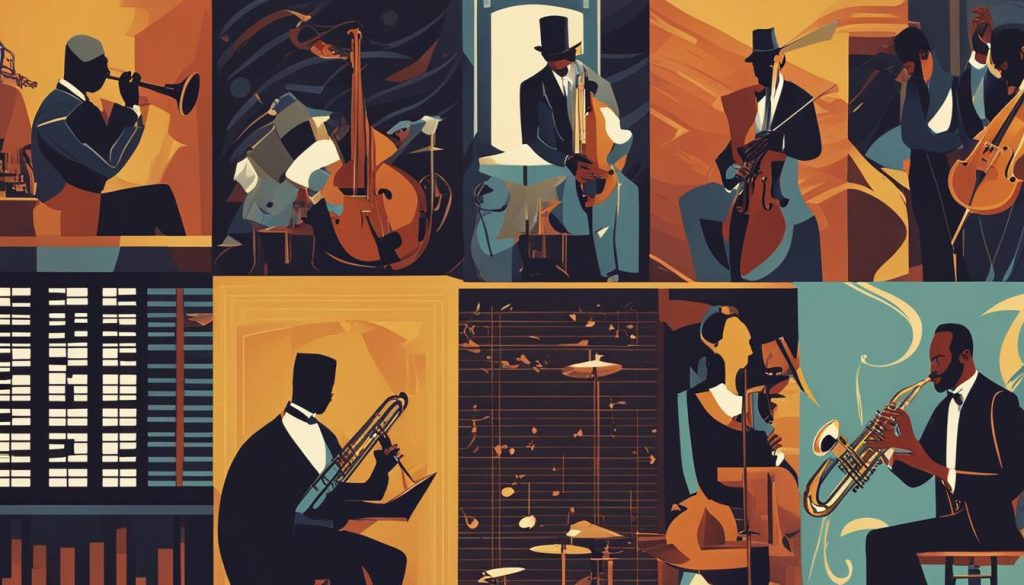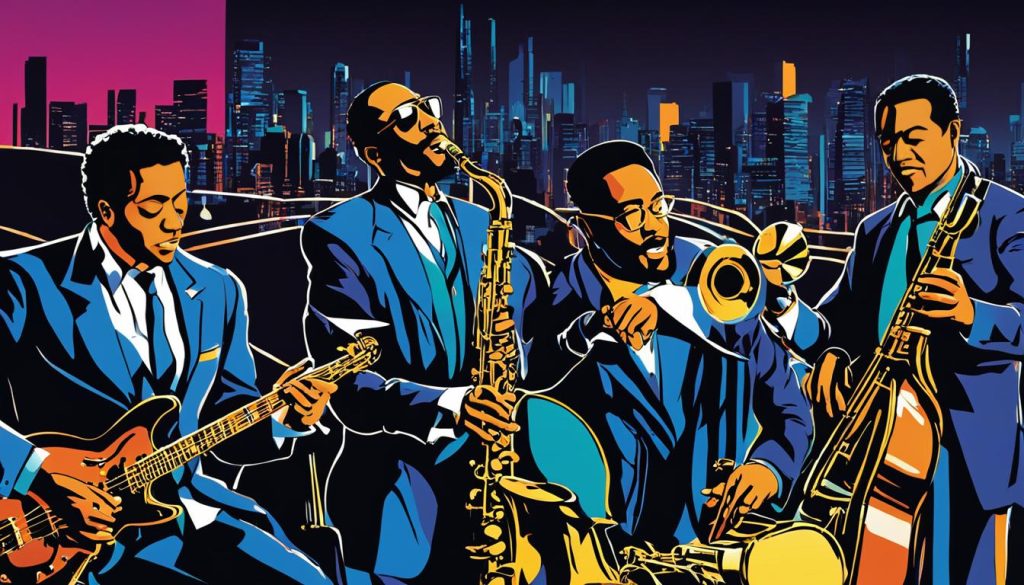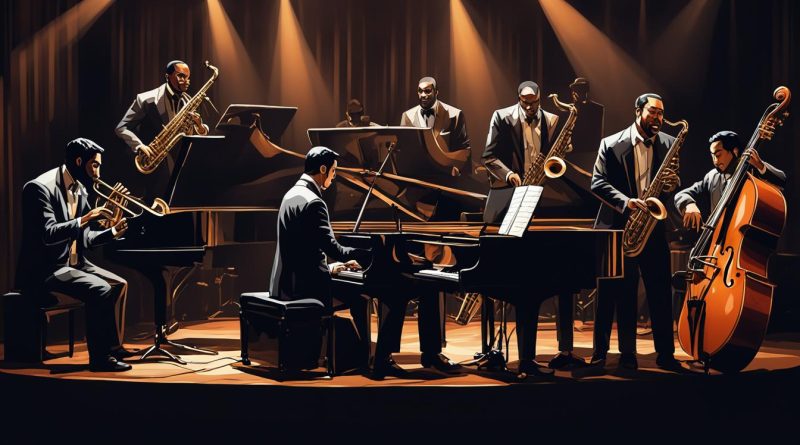Essential Jazz Music Guide: Styles & Artists
Jazz music is a genre that has captured the hearts of listeners worldwide, with its smooth rhythms, soulful melodies, and complex improvisation techniques. In this guide, you will explore the rich history of jazz, the various styles within the genre, and the influential artists who helped shape it into the cultural phenomenon it is today.
Key Takeaways:
- Jazz music is a captivating genre with a rich history.
- There are many diverse styles within jazz music, each with its own unique characteristics and notable artists.
- Influential jazz artists, such as Louis Armstrong and Miles Davis, have had a significant impact on the genre and the wider music world.
- Exploring the captivating sounds of jazz can deepen your appreciation for its rich history and cultural significance.
History of Jazz Music
Jazz music has a fascinating history rooted in African American communities in the late 19th and early 20th centuries. A key development that helped shape the genre was the cultural and musical exchange between African American musicians and European American audiences. This led to the blending of African and European musical traditions, resulting in a unique sound that laid the foundation for jazz music.
The pivotal moment that propelled jazz into the mainstream was the emergence of jazz bands in New Orleans. This city was a melting pot of different cultures, and the jazz bands played a key role in introducing the genre to a wider audience. Jazz music quickly spread throughout the US, and by the 1920s, it had become a cultural phenomenon.
“Jazz music is America’s past and its potential, summed up and sanctified and accessible to anybody who learns to listen to, feel, and understand it.” – Wynton Marsalis
During the swing era of the 1930s and 1940s, jazz music became more mainstream, with big bands and orchestras dominating the scene. The bebop revolution of the 1940s marked a shift towards a more complex and improvisational style of jazz, with artists such as Charlie Parker and Dizzy Gillespie leading the way.
Over the years, jazz music has continued to evolve, with the introduction of new subgenres such as cool jazz, hard bop, and fusion. Today, jazz remains a vibrant and influential genre, with its rich history and diverse styles inspiring musicians and listeners alike.

Styles of Jazz Music
When it comes to jazz music, there are numerous styles and sub-genres that define its vast universe. Here’s a breakdown of the most prominent styles:
Traditional Jazz
Also known as “Dixieland,” traditional jazz originated in New Orleans in the early 20th century. It features a range of instruments, including the cornet, clarinet, trombone, piano, and drums. Famous traditional jazz musicians include Jelly Roll Morton, Louis Armstrong, and Kid Ory.
Swing
Developed in the 1930s and 1940s, swing jazz is characterized by its upbeat, danceable rhythms, and big band sound. Prominent swing musicians include Benny Goodman, Count Basie, and Duke Ellington.
Bebop
Bebop emerged in the 1940s and was known for its fast-paced tempos, complex harmonies, and improvisation. Legends of bebop include Charlie Parker, Dizzy Gillespie, and Thelonious Monk.
Cool Jazz
Cool jazz originated in California in the 1950s. It was characterized by its mellow, relaxed sound, and its use of slower tempos and softer tones. Famous cool jazz musicians include Miles Davis, Dave Brubeck, and Chet Baker.
Fusion
Fusion jazz emerged in the late 1960s and fused elements of jazz with rock, funk, and other genres. It features a mix of electronic and acoustic instruments and is known for its experimental sound. Prominent fusion musicians include Herbie Hancock, Chick Corea, and Weather Report.

As can be seen, jazz music is varied and alive with creativity. From the traditional jazz of New Orleans to the fusion sounds of the 21st century, jazz has continued to evolve, adapting to new influences and pushing the boundaries of what’s possible. Each style is unique, offering its own rhythms, harmonies, and melodies that captivate audiences worldwide, making jazz music one of the most beloved and enduring genres of music in history.
Legendary Jazz Artists
Delight in the fascinating stories and contributions of some of the most extraordinary and legendary jazz artists who transformed the genre into an art form. These artists have left an indelible mark on jazz music, influencing generations of musicians and captivating audiences worldwide with their incredible talent, unique sounds, and cultural impact.
Louis Armstrong
| Born | August 4, 1901 |
|---|---|
| Birthplace | New Orleans, Louisiana |
| Style | New Orleans jazz, swing, Dixieland |
| Legacy | Popularized scat singing, pioneered jazz improvisation, known for hits like “What a Wonderful World” |
One of the most iconic figures in jazz music, Louis Armstrong was a trumpeter, composer, and singer whose profound impact on the genre remains undeniable. Known as “Satchmo,” Armstrong began his career in the 1920s and played a pivotal role in popularizing scat singing and improvisation. With hits like “What a Wonderful World,” he forever changed the face of jazz and helped it become a global phenomenon.
Ella Fitzgerald
| Born | April 25, 1917 |
|---|---|
| Birthplace | Newport News, Virginia |
| Style | Swing, bebop, vocal jazz |
| Legacy | Nicknamed “The First Lady of Song,” 13 Grammy Awards, Vocal Jazz and popular hit records, one of the most popular female jazz singers in history |
Ella Fitzgerald was an extraordinary jazz vocalist whose rich, warm voice and stunning range earned her the title “The First Lady of Song.” Born in Virginia, Fitzgerald grew up in poverty and began singing in a local club where she was discovered by influential jazz musicians. Over the course of her career, she won an astonishing 13 Grammy awards, recorded hit after hit, and became one of the most popular female jazz singers in history.
Miles Davis
| Born | May 26, 1926 |
|---|---|
| Birthplace | Alton, Illinois |
| Style | Bebop, cool jazz, jazz fusion |
| Legacy | Revolutionized jazz with his innovative style and use of electronics, numerous Grammy Awards and legacy as an influential performer and composer |
Miles Davis was a pioneering trumpeter, bandleader, and composer who is widely regarded as one of the most innovative and influential figures in jazz history. Davis was a key player in the development of bebop, cool jazz, and jazz fusion, and he revolutionized the genre with his use of electronics and experimentation. His vast and varied legacy continues to inspire musicians and listeners alike to this day.
John Coltrane
| Born | September 23, 1926 |
|---|---|
| Birthplace | Hamlet, North Carolina |
| Style | Hard bop, free jazz, modal jazz |
| Legacy | Revolutionized jazz with his experimental and improvisational style, considered one of the greatest saxophonists in history |
John Coltrane was a visionary saxophonist and composer who pushed the boundaries of jazz and transformed the genre with his innovative style. He played a key role in the development of hard bop, free jazz, and modal jazz, and his influence can be heard in the work of countless musicians today. Widely regarded as one of the greatest saxophonists in history, Coltrane’s legacy continues to thrive and inspire audiences around the world.
Conclusion
After exploring the history, styles, and legendary artists of jazz music, one cannot help but be captivated by its intricate sounds and rhythms. From its early origins in African American communities to its global influence today, jazz has left an indelible mark on the music world.
Through the various styles and subgenres of jazz music, the genre continues to evolve and adapt, showcasing its limitless possibilities. The works of legendary jazz artists such as Louis Armstrong, Ella Fitzgerald, Miles Davis, and John Coltrane have helped shape the genre and continue to inspire musicians today.
Whether one is a long-time jazz enthusiast or a newcomer to the genre, there is always something new to discover and appreciate. Embrace the captivating world of jazz music and explore the diverse range of sounds that define this unique genre.
FAQ
What is jazz music?
Jazz music is a genre characterized by its improvisational nature, syncopated rhythms, and expressive solos. It originated in African American communities in the late 19th and early 20th centuries and has since evolved into a diverse and influential art form.
What are the different styles of jazz music?
Jazz music encompasses a wide range of styles, including traditional jazz, swing, bebop, cool jazz, fusion, and many more. Each style has its own unique characteristics and influential artists who helped shape the sound.
Who are some legendary jazz artists?
Jazz has been shaped by numerous legendary artists over the years. Some notable names include Louis Armstrong, Ella Fitzgerald, Miles Davis, John Coltrane, and many others. These artists have made significant contributions to the genre and continue to inspire musicians today.
How did jazz music evolve throughout history?
Jazz music has a rich and vibrant history. It evolved from its roots in African American communities, incorporating elements from diverse musical traditions such as ragtime, blues, and gospel. Over time, jazz has undergone various stylistic changes, reflecting the social and cultural developments of each era.
Why is jazz music so influential?
Jazz music has had a profound influence on countless genres and musicians across the world. Its emphasis on improvisation, rhythmic complexity, and individual expression has inspired generations of musicians to push the boundaries of their craft. Jazz continues to be a source of inspiration and innovation in contemporary music.
Where can I listen to jazz music?
Jazz music can be enjoyed through various mediums. You can explore jazz albums by legendary artists, attend live jazz performances at clubs and festivals, or stream jazz playlists on popular music streaming platforms. Additionally, many cities have dedicated jazz clubs and radio stations that specialize in playing jazz music.
